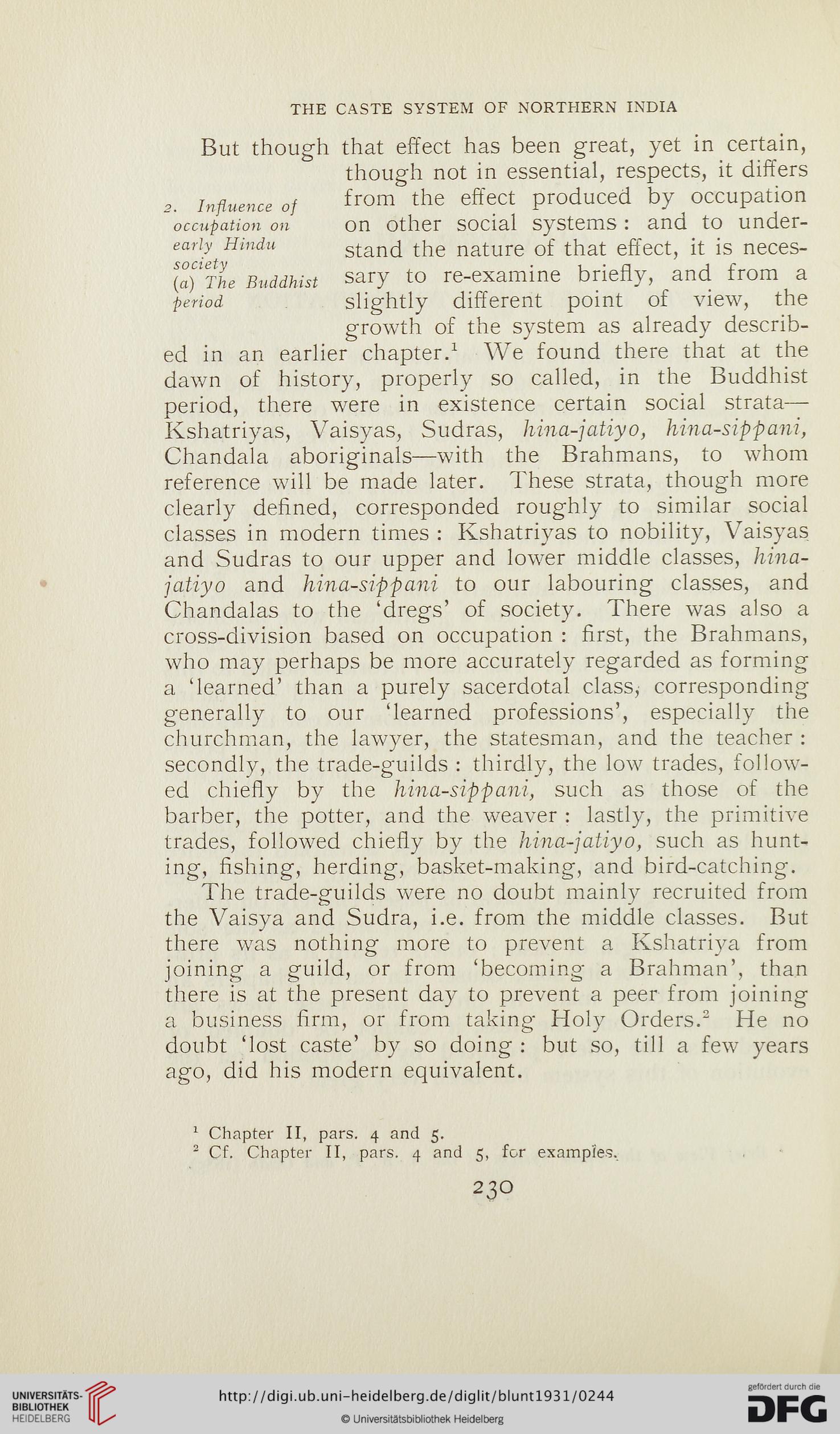THE CASTE SYSTEM OF NORTHERN INDIA
?. Influen.ee of
occupation on
early Hindu
society
(a) The Buddhist
period
But though that effect has been great, yet in certain,
though not in essential, respects, it differs
from the effect produced by occupation
on other social systems: and to under-
stand the nature of that effect, it is neces-
sary to re-examine briefly, and from a
slightly different point of view, the
growth of the system as already describ-
ed in an earlier chapter.1 We found there that at the
dawn of history, properly so called, in the Buddhist
period, there were in existence certain social strata—
Kshatriyas, Vaisyas, Sudras, hina-jatiyo, hina-sipfani,
Chandala aboriginals—with the Brahmans, to whom
reference will be made later. These strata, though more
clearly defined, corresponded roughly to similar social
classes in modern times : Kshatriyas to nobility, Vaisyas
and Sudras to our upper and lower middle classes, hina-
jatiyo and hina-sippani to our labouring classes, and
Chandalas to the ‘dregs’ of society. There was also a
cross-division based on occupation : first, the Brahmans,
who may perhaps be more accurately regarded as forming
a ‘learned’ than a purely sacerdotal class, corresponding
generally to our ‘learned professions’, especially the
churchman, the lawyer, the statesman, and the teacher :
secondly, the trade-guilds : thirdly, the low trades, follow-
ed chiefly by the hina-sippani, such as those of the
barber, the potter, and the weaver : lastly, the primitive
trades, followed chiefly by the hina-jatiyo, such as hunt-
ing, fishing, herding, basket-making, and bird-catching.
The trade-guilds were no doubt mainly recruited from
the Vaisya and Sudra, i.e. from the middle classes. But
there was nothing more to prevent a Kshatriya from
joining a guild, or from ‘becoming a Brahman’, than
there is at the present day to prevent a peer from joining
a business firm, or from taking Holy Orders.2 He no
doubt ‘lost caste’ by so doing : but so, till a few years
ago, did his modern equivalent.
1 Chapter II, pars. 4 and 5.
2 Cf. Chapter II, pars. 4 and 5, for examples.
23O
?. Influen.ee of
occupation on
early Hindu
society
(a) The Buddhist
period
But though that effect has been great, yet in certain,
though not in essential, respects, it differs
from the effect produced by occupation
on other social systems: and to under-
stand the nature of that effect, it is neces-
sary to re-examine briefly, and from a
slightly different point of view, the
growth of the system as already describ-
ed in an earlier chapter.1 We found there that at the
dawn of history, properly so called, in the Buddhist
period, there were in existence certain social strata—
Kshatriyas, Vaisyas, Sudras, hina-jatiyo, hina-sipfani,
Chandala aboriginals—with the Brahmans, to whom
reference will be made later. These strata, though more
clearly defined, corresponded roughly to similar social
classes in modern times : Kshatriyas to nobility, Vaisyas
and Sudras to our upper and lower middle classes, hina-
jatiyo and hina-sippani to our labouring classes, and
Chandalas to the ‘dregs’ of society. There was also a
cross-division based on occupation : first, the Brahmans,
who may perhaps be more accurately regarded as forming
a ‘learned’ than a purely sacerdotal class, corresponding
generally to our ‘learned professions’, especially the
churchman, the lawyer, the statesman, and the teacher :
secondly, the trade-guilds : thirdly, the low trades, follow-
ed chiefly by the hina-sippani, such as those of the
barber, the potter, and the weaver : lastly, the primitive
trades, followed chiefly by the hina-jatiyo, such as hunt-
ing, fishing, herding, basket-making, and bird-catching.
The trade-guilds were no doubt mainly recruited from
the Vaisya and Sudra, i.e. from the middle classes. But
there was nothing more to prevent a Kshatriya from
joining a guild, or from ‘becoming a Brahman’, than
there is at the present day to prevent a peer from joining
a business firm, or from taking Holy Orders.2 He no
doubt ‘lost caste’ by so doing : but so, till a few years
ago, did his modern equivalent.
1 Chapter II, pars. 4 and 5.
2 Cf. Chapter II, pars. 4 and 5, for examples.
23O




